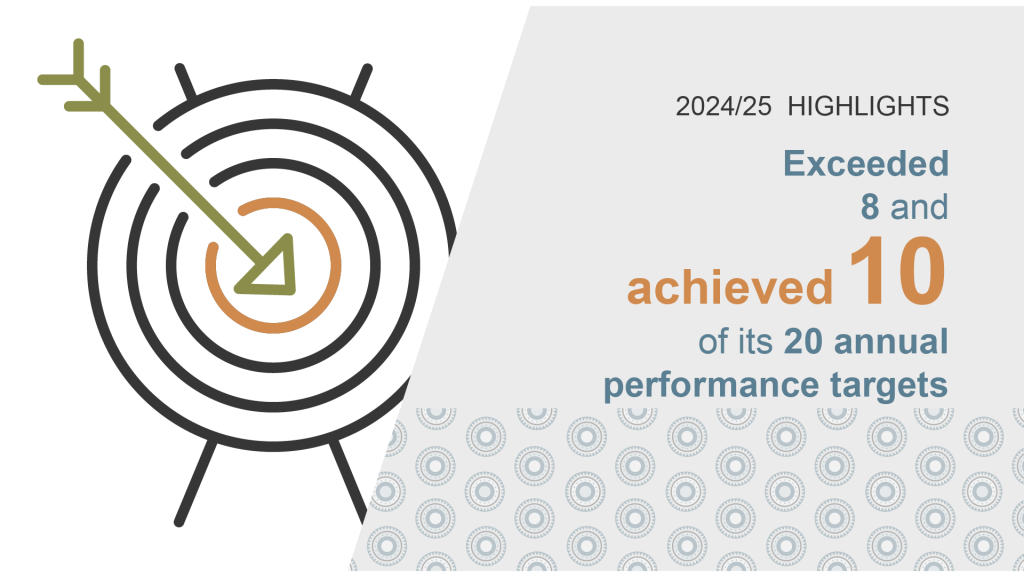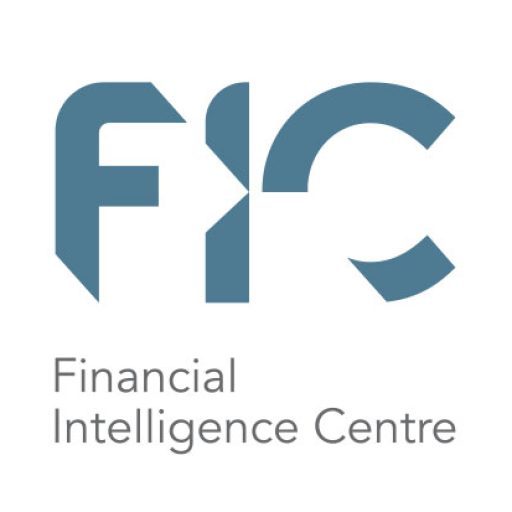The Financial Intelligence Centre (FIC) stands at the forefront of South Africa’s fight against financial crime as highlighted in the 2024/25 Annual Report which showcases a year of progress, innovation, and collaboration.
In 2024/25, the FIC continued its focused approach in the pursuit of assisting law enforcement and other partners to address financial crime in South Africa and assist in growing the economy.
The FIC’s annual report highlights how the country’s financial intelligence unit delivered on its mandate, achieved a clean audit, and contributed towards bringing South Africa closer to being de-listed as a jurisdiction under increased monitoring, commonly known as being ‘grey listed’.
Expanding mandate and enhanced compliance
The FIC’s mandate expanded significantly in December 2022, now overseeing compliance for all designated non-financial businesses and professions (DNFBPs), credit providers, and crypto asset service providers. This broadened scope required the FIC to refine its risk-based supervision approach, introducing new tools to identify institutions at higher risk of being abused for money laundering or terrorist financing.
By the end of March 2025, over 55 000 institutions were registered with the FIC, submitting approximately 13.5 million regulatory reports.
During 2024/25, the FIC conducted 157 compliance reviews and issued reports to assist reviewed institutions with improving their understanding and execution of the compliance obligations under the Financial Intelligence Centre Act (FIC Act). Compliance reviews provide an opportunity for the FIC to increase accountable institutions’ awareness of their FIC Act obligations and assist them firsthand, with improving the quality and quantity of regulatory reports they submit.
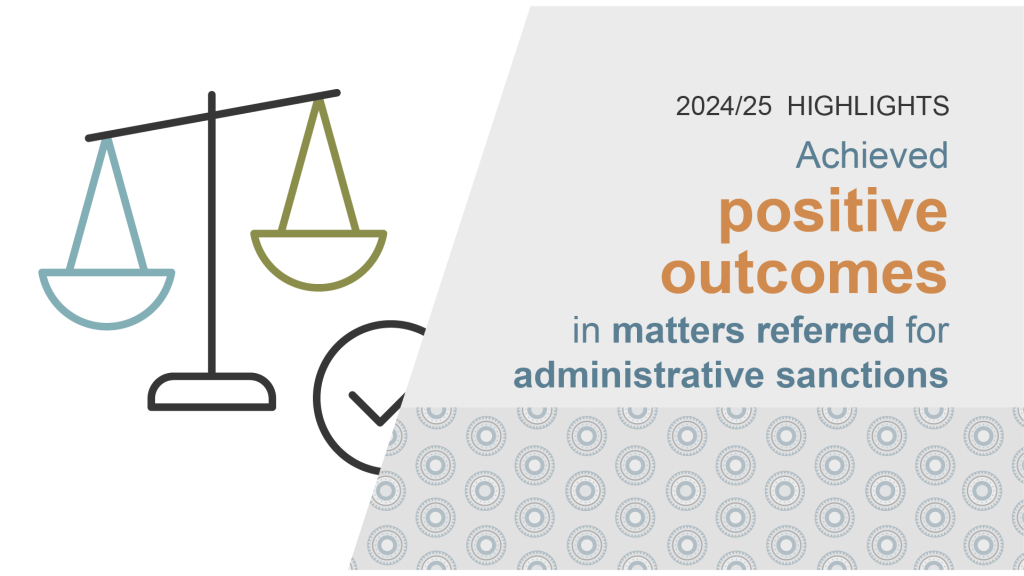
Financial intelligence in action
The FIC’s work has a tangible impact on South Africa’s economy and society by identifying and disrupting illicit financial flows, supporting asset recovery, and fostering a culture of compliance. In doing so, the FIC helps protect the country from the corrosive effects of financial crime. It produces various financial intelligence reports following its analysis of regulatory reports and information it receives accountable institutions.
The financial intelligence reports are submitted to law enforcement, the revenue service, and other competent authorities for use in their investigations, prosecutions and applications for asset forfeiture. The FIC does not itself conduct investigations.
The FIC contributed to the recovery of close to R144 million in criminal proceeds in 2024/25 flowing from the 3 104 reactive and 1 092 proactive financial intelligence reports it produced, as well as 51 reports on illicit financial flows.
Established within the FIC in May 2023, the Shared Forensic Capability (SFC) provides forensic service support to law enforcement, revenue authorities, intelligence services, and other competent authorities in terms of section 40 of the FIC Act. Forensic support includes specialised resources in forensic accounting, analysis and reporting, as well as producing forensic evidence and presenting such evidence in court.
In its first full year of operation, the SFC division contributed to asset recoveries to the value of R14.37 million and to the enrolment of 14 cases for prosecution.
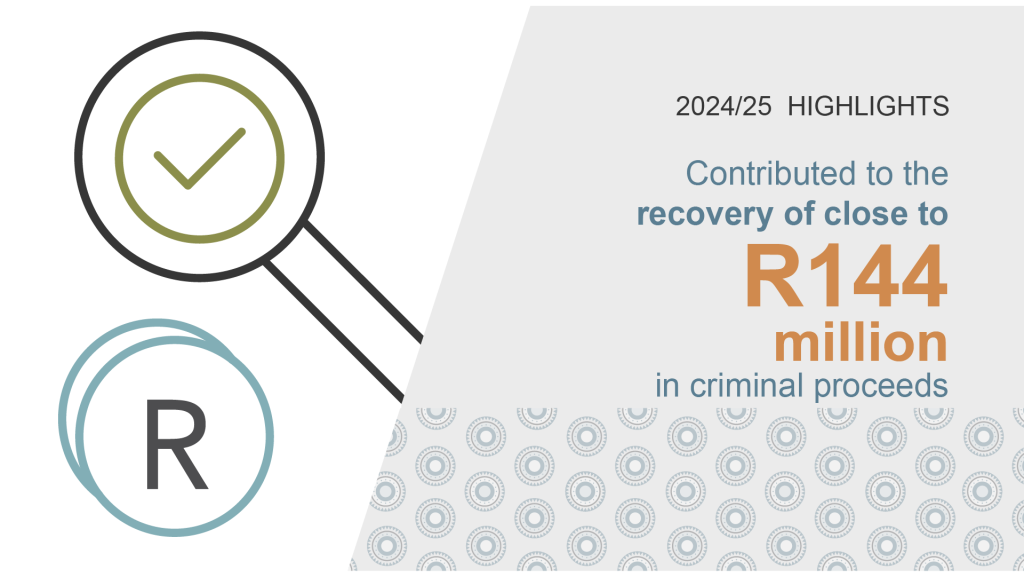
Facilitating the sharing of information
The FIC continued to play a leading role in the timeous sharing of financial and other information between partners in government, civil society, and the private sector to expedite the prevention, detection, investigation and resolution of criminal matters.
This flow of information was facilitated in 2024/25 through FIC-led national initiatives such as the Reformed Fusion Centre and the Asset Recovery Hub.
The Asset Recovery Hub is aimed at fast-tracking matters towards asset recovery where there is a high risk of assets being dissipated. Working closely with the Asset Forfeiture Unit in the National Prosecuting Authority, and with the support of law enforcement partners, the hub initiated 11 investigations which resulted in the recovery of more than R33 million in proceeds of crime.
In the past financial year, the Reformed Fusion Centre, under the stewardship of the FIC, co-ordinated multi-disciplinary teams investigating 562 cases including those that were dealing with serious and complex money laundering.
The Reformed Fusion Centre was instrumental in the recovery of proceeds of crime to the value of approximately R93 million in one of the investigations.
“Based on the solid foundations put in place since its inception, the FIC continues to shape itself as a forward-thinking organisation with enhanced capabilities to anticipate and act with agility to the demands of South Africa’s crime fighting ecosystem.”
Acting Director of the FIC, Pieter Smit
Risk-based supervision
The FIC follows a risk-based supervision approach by identifying accountable institutions at higher risk of being abused for money laundering and terrorist financing.
This guided the FIC’s supervisory approach and compliance monitoring actions in accordance with individual institutions’ money laundering and terrorist financing risks.
Based on the risk assessments, the FIC conducted 556 inspections in 2024/25, the majority of which were inspections of medium and high-risk institutions.
Emanating from the inspections, 330 institutions were issued with reports requiring them to implement remedial actions because of non-compliance. Entities that did not remediate the non-compliance were subjected to enforcement or monitoring.
The FIC issued 25 administrative sanctions on designated non-financial businesses and professions during the 2024/25 financial year, two of which lodged appeals, which are yet to be heard by the FIC Act Appeal Board.
In addition, an appeal by one institution – of which five of its registered branches were sanctioned separately – was upheld by the FIC Act Appeal Board. Sanctions to the value of R2 228 000 were imposed by the FIC in the financial year.
Through the financial year the FIC continued to provide guidance and awareness activities to enhance compliance with the FIC Act and improved understanding of anti-money laundering, combating the financing of terrorism and combating proliferation financing measures.
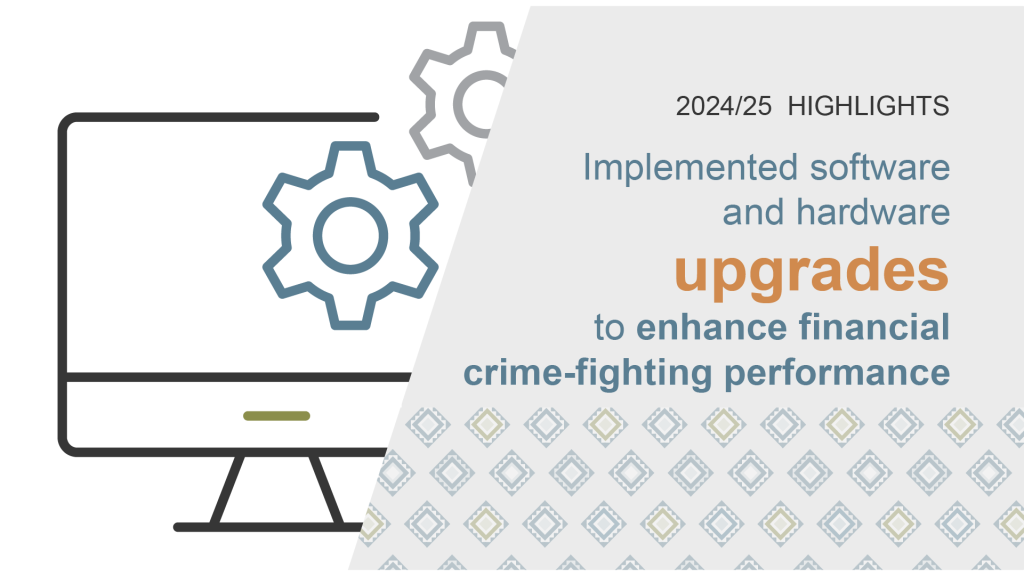
Collaboration and partnerships
South Africa is part of a global network of countries working to prevent money laundering and to combat financing of terrorism. The country is a member of FATF and Eastern and Southern Africa Anti-Money Laundering Group (ESAAMLG), and the FIC is a member of the Egmont Group of Financial Intelligence Units (Egmont Group) and various regional bodies across the globe.
As South Africa’s financial intelligence unit, the FIC leads the South African delegation to ESAAMLG while it is a member of the country’s delegation to FATF, led by National Treasury.
Internationally, the FIC maintains 102 memoranda of understanding with foreign financial intelligence units, facilitating swift cross-border co-operation.
Technology and innovation
To keep pace with sophisticated financial crime, the FIC continues to invest in artificial intelligence, machine learning, and advanced analytics. These technologies will enhance the quality and speed of financial intelligence products, support cyber security, and enable the FIC to respond to increasing demands from stakeholders.
During the year under review, the FIC started the exercise of using artificial intelligence and machine learning technologies to improve productivity and optimise production efficiencies with the aim of improving the quality of financial intelligence products it produces for the use of competent authorities in their investigations, prosecutions and applications for asset forfeiture.
Human capital
The FIC recruited 55 new employees in the financial year, bringing the FIC workforce complement to 275 on 31 March 2025 (2023/24: 257).
As part of its commitment to maintaining a transformed and equitable workforce where total of 84.98 percent of the FIC’s employee complement is from designated race groups and 61.90 percent is female.
